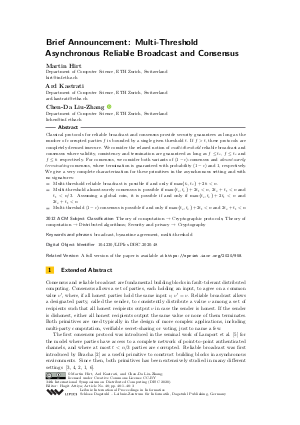Brief Announcement: Multi-Threshold Asynchronous Reliable Broadcast and Consensus
Authors
Martin Hirt,
Ard Kastrati,
Chen-Da Liu-Zhang 
-
Part of:
Volume:
34th International Symposium on Distributed Computing (DISC 2020)
Part of: Series: Leibniz International Proceedings in Informatics (LIPIcs)
Part of: Conference: International Symposium on Distributed Computing (DISC) - License:
 Creative Commons Attribution 3.0 Unported license
Creative Commons Attribution 3.0 Unported license
- Publication Date: 2020-10-07
File

PDF
LIPIcs.DISC.2020.48.pdf
- Filesize: 356 kB
- 3 pages
Document Identifiers
Related Versions
-
A full version of the paper is available at https://eprint.iacr.org/2020/958.
Subject Classification
ACM Subject Classification
- Theory of computation → Cryptographic protocols
- Theory of computation → Distributed algorithms
- Security and privacy → Cryptography
Keywords
- broadcast
- byzantine agreement
- multi-threshold
Metrics
- Access Statistics
-
Total Accesses (updated on a weekly basis)
0Document
0Metadata
Abstract
Classical protocols for reliable broadcast and consensus provide security guarantees as long as the number of corrupted parties f is bounded by a single given threshold t. If f > t, these protocols are completely deemed insecure. We consider the relaxed notion of multi-threshold reliable broadcast and consensus where validity, consistency and termination are guaranteed as long as f ≤ t_v, f ≤ t_c and f ≤ t_t respectively. For consensus, we consider both variants of (1-ε)-consensus and almost-surely terminating consensus, where termination is guaranteed with probability (1-ε) and 1, respectively. We give a very complete characterization for these primitives in the asynchronous setting and with no signatures:
- Multi-threshold reliable broadcast is possible if and only if max{t_c,t_v} + 2t_t < n.
- Multi-threshold almost-surely consensus is possible if max{t_c, t_v} + 2t_t < n, 2t_v + t_t < n and t_t < n/3. Assuming a global coin, it is possible if and only if max{t_c, t_v} + 2t_t < n and 2t_v + t_t < n.
- Multi-threshold (1-ε)-consensus is possible if and only if max{t_c, t_v} + 2t_t < n and 2t_v + t_t < n.
Cite As Get BibTex
Martin Hirt, Ard Kastrati, and Chen-Da Liu-Zhang. Brief Announcement: Multi-Threshold Asynchronous Reliable Broadcast and Consensus. In 34th International Symposium on Distributed Computing (DISC 2020). Leibniz International Proceedings in Informatics (LIPIcs), Volume 179, pp. 48:1-48:3, Schloss Dagstuhl – Leibniz-Zentrum für Informatik (2020)
https://doi.org/10.4230/LIPIcs.DISC.2020.48
BibTex
@InProceedings{hirt_et_al:LIPIcs.DISC.2020.48,
author = {Hirt, Martin and Kastrati, Ard and Liu-Zhang, Chen-Da},
title = {{Brief Announcement: Multi-Threshold Asynchronous Reliable Broadcast and Consensus}},
booktitle = {34th International Symposium on Distributed Computing (DISC 2020)},
pages = {48:1--48:3},
series = {Leibniz International Proceedings in Informatics (LIPIcs)},
ISBN = {978-3-95977-168-9},
ISSN = {1868-8969},
year = {2020},
volume = {179},
editor = {Attiya, Hagit},
publisher = {Schloss Dagstuhl -- Leibniz-Zentrum f{\"u}r Informatik},
address = {Dagstuhl, Germany},
URL = {https://drops.dagstuhl.de/entities/document/10.4230/LIPIcs.DISC.2020.48},
URN = {urn:nbn:de:0030-drops-131267},
doi = {10.4230/LIPIcs.DISC.2020.48},
annote = {Keywords: broadcast, byzantine agreement, multi-threshold}
}
Author Details
References
- Michael Ben-Or. Another advantage of free choice: Completely asynchronous agreement protocols (extended abstract). In Proceedings of the Second Annual ACM SIGACT-SIGOPS Symposium on Principles of Distributed Computing, pages 27-30. ACM, 1983. URL: https://doi.org/10.1145/800221.806707.
- Gabriel Bracha. Asynchronous Byzantine agreement protocols. Information and Computation, 75(2):130-143, 1987. URL: https://doi.org/10.1016/0890-5401(87)90054-X.
-
Danny Dolev and H. Raymond Strong. Authenticated algorithms for byzantine agreement. SIAM Journal on Computing, 12(4):656-666, 1983.

-
Pesech Feldman and Silvio Micali. An optimal probabilistic protocol for synchronous byzantine agreement. SIAM Journal on Computing, 26(4):873-933, 1997.

-
Leslie Lamport, Robert Shostak, and Marshall Pease. The byzantine generals problem. ACM Transactions on Programming Languages and Systems, 4(3):382-401, 1982.

- Achour Mostéfaoui, Moumen Hamouma, and Michel Raynal. Signature-free asynchronous Byzantine consensus with t < n/3 and O(n²) messages. In ACM Symposium on Principles of Distributed Computing, pages 2-9. ACM, 2014. URL: https://doi.org/10.1145/2611462.2611468.
